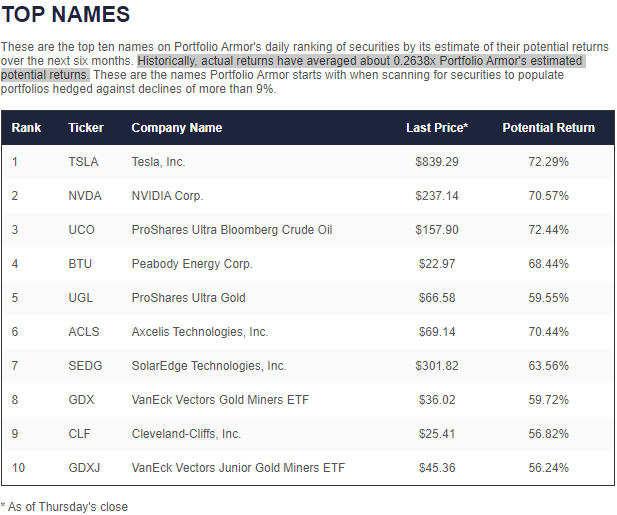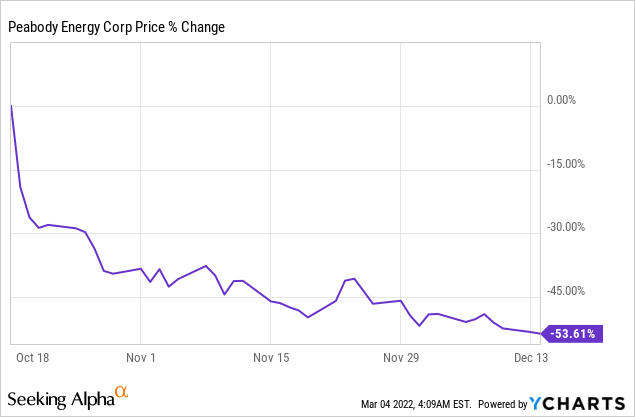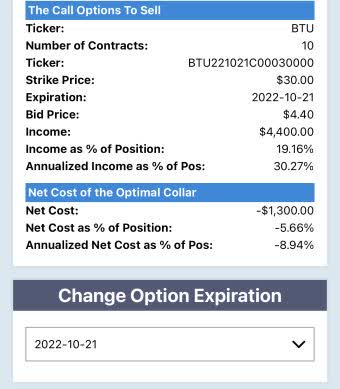Coal Goes Parabolic
Before the current war in Ukraine, there was already upward pressure on coal, due to a combination of the lockdowns limiting production in 2020 plus a misguided focus renewable energy, as Noah Rothman noted last October:
The sloppy, blinkered effort to transition away from fossil fuels to hypothetical sources of power that cannot meet the energy consumption needs of the planet due to the constraints imposed on them by the laws of physics is an obstacle to meeting “newly minted environmental, social and governance standards for clean energy.”
And a prime beneficiary of that was Peabody Energy Corporation BTU, whose shares spiked that in October after the company announced that its coal revenue in Q3 would be the highest in seven quarters and it offered bullish forward guidance. BTU shares spiked again last month, as the company posted another monster quarter in Q4. Russia's invasion of Ukraine--and the extraordinary sanctions levied against Russia in response--will likely add fuel to this quarter.
As Bloomberg energy reporter Javier Blas noted on Thursday, Russia is a major coal exporter (#3 in the world in 2019), and high quality coal has nearly doubled in price as some buyers are eschewing Russian commodities, which is limiting global supply.
A Top Name Again
Our system gauges stock and options market sentiment to estimate which securities are likely to do well over the next six months. Peabody was one of our system's top names last summer, and appeared in a portfolio we shared here at the time.
It was a top name again last October, and it's a top name again now. On Thursday, it appeared in our top ten alongside the ProShares Ultra Bloomberg Crude Oil ETF UCO, and the steel company Cleveland-Cliffs, Inc. CLF, which are benefiting from similar reductions in global supply from Russia (the #3 oil exporter and #5 steel exporter in 2019). Our top name on Thursday, Tesla, Inc. TSLA is also, of course, an indirect beneficiary of higher oil prices as an electric vehicle company.

Screen capture via Portfolio Armor on 3/3/2022.
A Roller Coaster Ride For BTU Shareholders
Despite benefiting from strong demand for its commodity, Peabody Energy has tested the stomachs of its shareholders over the last several months. After spiking on its Q3 earnings in October, the stock lost more than half its value over the next two months.

For investors want to hold BTU while limiting their downside risk, below is a way to do so.
Limiting Your Downside Risk In BTU
As of Thursday's close, this was the optimal collar to protect against a greater-than-25% drop in BTU between now and October while not capping your upside at less than 30% over the same time frame.


The net cost of this collar was negative, meaning you would have collected a net credit of $1,300 when opening this hedge on Thursday, assuming, to be conservative, that you placed both trades at the worst ends of their respective spreads (buying the puts at the ask and selling the calls at the bid). In practice, of course, you can often buy and sell options at some price between the bid and ask, so your net credit would likely have been larger than $1,300 had you done that.
Edge Rankings
Price Trend
© 2025 Benzinga.com. Benzinga does not provide investment advice. All rights reserved.
Trade confidently with insights and alerts from analyst ratings, free reports and breaking news that affects the stocks you care about.